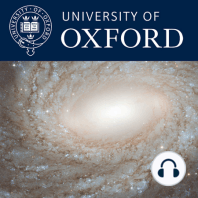51 min listen

Extra Time: Professor Sir Roger Penrose in conversation with Andrew Hodges - part one
Extra Time: Professor Sir Roger Penrose in conversation with Andrew Hodges - part one
ratings:
Length:
51 minutes
Released:
Jun 18, 2014
Format:
Podcast episode
Description
These two video sessions explore the development of Sir Roger Penrose's thought over more than 60 years, ending with his most recent theories and predictions. In the first session, Roger Penrose explains the impact of his time at Cambridge in the 1950s. The interview brings out his highly unconventional choice of subjects for deep study, which completely ignored the boundary between 'pure' and 'applied' mathematics. Those familiar with his world-leading development of relativity theory in the 1960s may be surprised to learn how much he was influenced by quantum theory in the 1950s, and also by the early origin of his new ideas.
Roger Penrose explains the influence of Dirac, Sciama and other leading figures of the 1950s, and goes on to characterise the emergence of twistor theory. Non-experts will be interested to hear how the ideas of his best-known work, The Emperor's New Mind, also had an origin in this early period. Roger Penrose also adds fascinating detail about the psychology of mathematical discovery, explaining how he was very slow at school, needing extra time to think issues through for himself. The mystery of time, in physics and human consciousness, runs through the entire conversation, and lights up even the most technical aspects of the discussion.
Roger Penrose explains the influence of Dirac, Sciama and other leading figures of the 1950s, and goes on to characterise the emergence of twistor theory. Non-experts will be interested to hear how the ideas of his best-known work, The Emperor's New Mind, also had an origin in this early period. Roger Penrose also adds fascinating detail about the psychology of mathematical discovery, explaining how he was very slow at school, needing extra time to think issues through for himself. The mystery of time, in physics and human consciousness, runs through the entire conversation, and lights up even the most technical aspects of the discussion.
Released:
Jun 18, 2014
Format:
Podcast episode
Titles in the series (93)
Putting the Higgs Boson in its Place: Professor Melissa Franklin talks about her experiences working towards the discovery of the Higgs Boson and her work today at the Large Hadron Collider by The Secrets of Mathematics